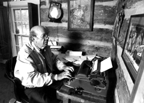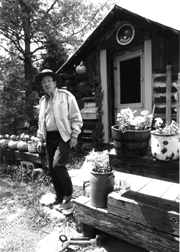|
In the back-seat of the car a baby gurgles and grins at the stoop shouldered, kind-
faced man bending over the bassinet to bid good-bye. "You are now de-bastardized,"
the Rev. Will Campbell proclaims. A glint of subversiveness crinkles in his eyes. The
parents, married just moments before, smile sheepishly, pause then chuckle. They don't
quite know what to make of Campbell.
They are not alone.
Who is Campbell? Affixing him with a label is about as easy as putting
socks on a rooster.
A self-defined "Seventh Day Horizontalist" who claims to "have no truck with the
steeple," this Amite County, Miss. native, Yale Divinity School graduate and
ordained Baptist preacher, has made a career out of confounding critics, assuaging
fears and preaching the gospel. Along the way, he has also found the time to publish a
book or five.
Alternately celebrated and vilified for his role in the civil rights movement,
Campbell earned his stripes early in the struggle as the only white man present at the
founding of the Southern Christian Leadership Council. He was a trusted confidant of Dr.
Martin Luther King Jr. And when it came time to integrate the schools in Little Rock, Ark.,
Campbell was at the side of the nine children as they crossed the threshold of Central
High.
Yet, Campbell is no knee-jerk liberal, no crusading do-gooder intent upon atoning
for the sins of his people; he's a redneck -- and a proud one at that.
He finds his inspiration in the words of the Bible and the work of organizations
like the Southern Tenant Farmers Union.
And, he sees hope in a new generation of Southerners, among whom he counts his "beautiful and brilliant lesbian daughter."
Though he and his wife Brenda claim to be slowing down, neither they nor their
three children perceive any change. "We're retired," Brenda says, "but I don't know
what from."
 These days, Brother Will is at work on a new book. As yet unnamed, it tells the
story of the Rev. Duncan Gray of St. Peter's Church in Oxford, Miss. and his efforts to
help peacefully integrate the University of Mississippi. Campbell interweaves Gray's life
with the story of the University Grays, a regiment of University of Mississippi student-
soldiers, all of whom were killed at Gettysburg. "The University Grays are the peanut
butter that holds together the light bread in Duncan Gray's story," Campbell says. These days, Brother Will is at work on a new book. As yet unnamed, it tells the
story of the Rev. Duncan Gray of St. Peter's Church in Oxford, Miss. and his efforts to
help peacefully integrate the University of Mississippi. Campbell interweaves Gray's life
with the story of the University Grays, a regiment of University of Mississippi student-
soldiers, all of whom were killed at Gettysburg. "The University Grays are the peanut
butter that holds together the light bread in Duncan Gray's story," Campbell says.
On a recent Saturday afternoon, Campbell entertained a group of visitors at
his rustic log cabin on the outskirts of Mt. Juliette, Tenn. With a glass of homemade corn liquor by
his side and a guitar in his hands, he sat, holding court and preaching the redneck gospel
according to Will. As he strummed and sipped, Campbell reminisced and railed. There is
much that raises the ire of Brother Will. A deeply religious man who deeply distrusts
organized religion, he is quick to denounce media-made preachers like Jerry Falwell and
Pat Robertson, often referring to them as "right-wing, electronic, soul molesters." Of
late, he has dedicated much of his energy to rescuing the word redneck from pejorative
misuse.
"Redneck is a word I detest because it means nigger," he says. He sees the fate of
poor whites and blacks of the South as being inextricably linked. Though Campbell has
spent a good portion of his life working to secure equal rights for Southern blacks, he
doesn't believe that white Klan members have a patent\ on the South's ills. Many is the
time that Campbell has visited a Klansman in jail or shared a shot of whiskey with an
ardent segregationist. For Brother Will, the reasons are elemental -- and humbling.
"We're all bastards," he says, "but God loves us anyway."
For Campbell, the blame for our divisive past and present is to be laid at the feet
of the upper classes who have pitted poor whites against poor blacks. The bad
guys in the "world according to Will" are those members of today's "enlightened
society" who decry the use of expletives like broad, kike, wop or dyke, but snigger
conspiratorially when they hear someone of the white, rural laboring class of the South
referred to as a redneck. Campbell hopes to help poor whites and blacks of the South
appreciate their common plight and shed their much maligned monikers. If he raises a
little hell and ruffles a few feathers along the way, then so be it.
After 73 years of fighting the good fight, Campbell has not mellowed. And
the South is a better place for it. In fact, the only thing mellow about Brother Will is the
fine corn liquor he offers to visitors around for "toddy time." The offer is pure Campbell --
cynical and jocular and ultimately unselfish: "Care for a slug of the Ark of the
Covenant?" he asks.
Southern Tenant Farmers Union: Founded in Tyzona,
Ark. In 1934, the Southern Tenant Farmers Union was composed of both black and white
sharecroppers, tenants and small businessmen who fought for economic viability with
little regard for race and much disdain for class based oppression. Fundamentalist
Christian beliefs featured prominently in the tenets of the organization. By the outbreak
of World War Two, the union was in shambles, the victim of violence and internal
turmoil.
| 
Preacher, author and civil rights advocate Will Campbell leaves his rustic cabin in Mt. Juliet, Tenn.(Photos courtesy of the Atlanta Journal-Constituion and the Associated Press) Rev. Campbell's books can be found at Amazon.com Books.
|




